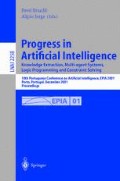Abstract
The present paper concentrates on one modeling approach for homogenous societies of agents in a given environment. It is an extension of the existing Interactivist-Expectative Theory on Agency and Learning to multiagent environments. The uniagent theory’s key phrases are expectancy and learning through interactions with the environment. Motivated by the research done in the domain of imitation in humans, this paper introduces learning by imitation through interaction between akin agents. The social consequences of such an environment from the perspective of learning and emergence of language are discussed as well.
Access this chapter
Tax calculation will be finalised at checkout
Purchases are for personal use only
Preview
Unable to display preview. Download preview PDF.
References
Byrne R W, Russon A E, “ Learning by Imitation”, Behavioral and Brain Sciences (2001).
Ferber J: Multi-Agent Systems: An Introduction to Distributed Artificial Intelligence, Addison-Wesley, 1999.
Fikes R E, Nilsson N J, “Learning and executing generalized robot plans”, Artificial Intelligence, 3(4) (1972).
Nehaniv C, Dautenhahn K, “Mapping between dissimilar bodies: Affordances and the algebraic foundations of imitation”, Proceedings of the Seventh European Workshop on Learning Robots Edinburgh, UK (1998) 64–72.
Piaget, J Play, Dreams, and Imitation in Childhood, Norton, New York, 1945.
Rizzolatti G, Fadiga L, Gallese V, Fogassi L, Premotor cortex and the recognition of motor actions. Cognitive Brain Research, 3(2) (1996) 131–141
Schaal S, Sternad D, “Programmable pattern generators”, Proceedings, 3rd International Conference on Computational Intelligence in Neuroscience”, Research Triangle Park, NC, (1998) 48–51.
Stojanov G, Bozinovski S, Trajkovski G, “Interactionist-Expectative View on Agency and Learning”, IMACS Journal for Mathematics and Computers in Simulation, North-Holland Publishers, Amsterdam, Vol. 44 (1997).
Stojanov G, Trajkovski G, Bozinovski S, “The Status of Representation in Behavior Based Robotic Systems: The Problem and A Solution”, IEEE Conference Systems, Man, and Cybernetics, Orlando (1997).
Thorndike E L, “Animal intelligence: an experimental study of the associative process in animals” Psychological Review Monograph 2(8) (1898) 551–553.
Trajkovski G, Stojanov G, “Algebraic Formalization of Environment Representation”, in: (Tatai, G., Gulyas, L. (eds)) Agents Everywhere, Springer, Budapest, HU (1998) 59–65.
Author information
Authors and Affiliations
Editor information
Editors and Affiliations
Rights and permissions
Copyright information
© 2001 Springer-Verlag Berlin Heidelberg
About this paper
Cite this paper
Trajkovski, G. (2001). An Imitation-Based Approach to Modeling Homogenous Agents Societies. In: Brazdil, P., Jorge, A. (eds) Progress in Artificial Intelligence. EPIA 2001. Lecture Notes in Computer Science(), vol 2258. Springer, Berlin, Heidelberg. https://doi.org/10.1007/3-540-45329-6_25
Download citation
DOI: https://doi.org/10.1007/3-540-45329-6_25
Published:
Publisher Name: Springer, Berlin, Heidelberg
Print ISBN: 978-3-540-43030-8
Online ISBN: 978-3-540-45329-1
eBook Packages: Springer Book Archive

